Long before Walt Whitman revealed that he contained multitudes, people have been complicated. (This sounds like I’m writing an essay for a first-year composition course, but please bear with me.)
Gavin Maxwell was born an aristocrat, but to make his way, he joined Ishmael in the slaughter of large ocean creatures for their oil; in his case, basking sharks. Once plentiful, now scarce, he hunted them in the hundreds, if not thousands, with machine guns off the Atlantic coast of Scotland. Until one day, the bloodiness of the business gave him a change of heart.
When reading early naturalists, I’m often quite stunned at the mental gymnastics required to shotgun a bird you’ve seen for the first time, so that you can return with a “specimen.” The world was one of plenty, then; we live in the Sixth Extinction, and can only imagine the immensity of living creatures before we harvested them for our needs. The Passenger Pigeon is the most famous example; sky-darkening swarms, boughs laden with their roosts, and now: gone.
As beautiful as the western Highlands of Scotland are, and the bright blue ocean, life was so uncommon that it was impossible not to see that visiting was the equivalent of the scene in a post-apocalyptic film where the last human gazes upon a landscape where they are utterly alone. In the distance, I saw geese, gulls, shags, and perhaps an eagle. Up close the birds were shy, except for this cheerful Sedge Warbler:
We did encounter a lot of livestock, including some jersey cows, one of which attacked our car. In Scotland, the people were very friendly, but the cows were not. Our approach to Sandaig took us down a single lane road through a herd of them. After a certain amount of time, I honked the horn once and waited for them to clear off the road.
This was my mistake, trusting a cow.
Once they had us surrounded, they trotted back onto the asphalt and one gored our vehicle in two places, to show us who’s boss. We escaped with no further damage to human or beast, and a tale to tell.
Getting to Camusfearna—which was Gavin Maxwell’s invented name for Sandaig, to keep his whereabouts anonymous from readers—took us another half hour or so through narrow village roads to a gated trail, where we walked another mile and change down to the sea. This is where I encountered the Sedge Warblers, warbling in the sedge as expected.
We met a friendly young couple on our hike down to the beach, both fans of Jane Austen, who we chatted with on our little hike. The stretch of land to the sea is quite beautiful in that lush and rough way of the Highland coast. There were small tidal pools, and evidence of worms or mollusks in the sand, some of which had been eaten by gulls or sea birds, and some which left little air holes in the sand.
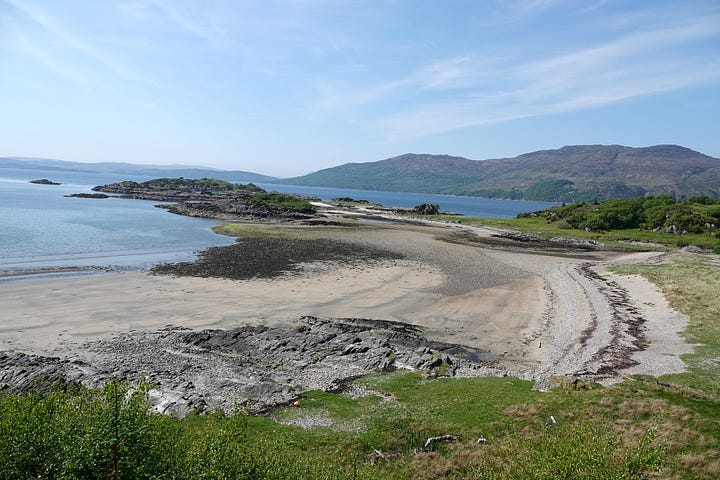
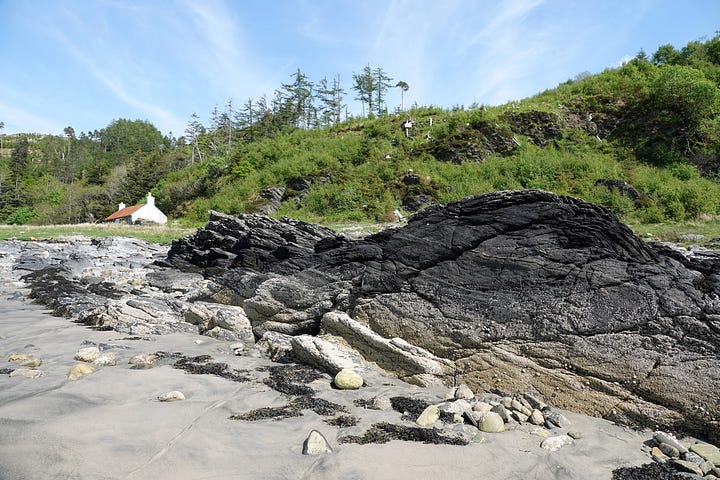
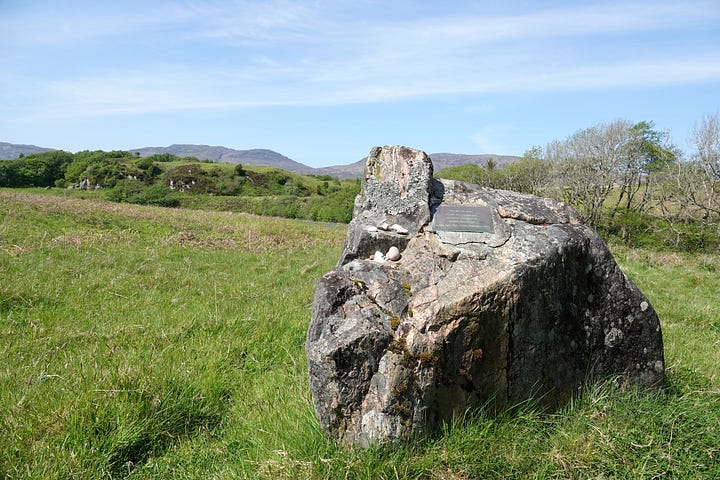
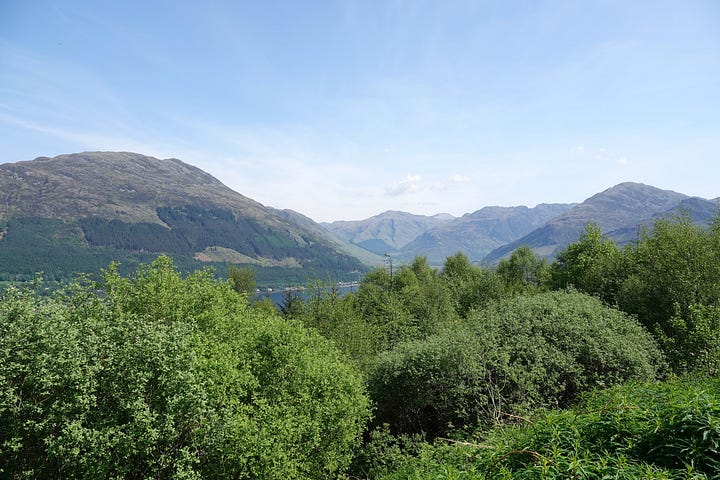
Here is where Maxwell and Edal the Otter are memorialized with a plaque on the rock. Edal died after the cottage burned down in a fire. No less tragic than the death of Mijbil, the first otter he raised, who was killed with a shovel by a truck driver and dumped in a ditch. Mijbil had free rein of the countryside and often hopped along the road to the village. Today we would look on a three foot long weasel with awe, especially if friendly, but otter hunts were popular in the English countryside, as described in Tarka the Otter by Henry Williamson; they were hounded to death much like foxes on the better-known and reviled fox hunts, but by working people. Otters can eat a whole lot of fish, and humans don’t like competition.
Most often, making pets of wild animals ends in tragedy, and I find the act selfish. On the other hand, people like Mikayla of Save a Fox, who rescue animals exploited for fur farms, the pet trade, and so on, that I respect. Sadly, the human trash of the internet often don’t. Mikayla was hounded to death by online cyberbullies from places like Reddit, which has rules against “brigading” against other websites, yet allows forums for hating human beings and acting on it.
As I said, Maxwell was a complicated man. Those are the opening lines of Emily Wilson’s excellent translation of The Odyssey:
Let me tell you of a complicated man.
Maxwell was gay at a time when being open would mean imprisonment or harrying until death, much like England did to war hero Alan Turing, who helped break the Enigma code. Maxwell tried marriage with women, but they did not last, as expected. Kathleen Raine loved him, and put a curse on him for his treatment of her; yet they were close enough that he took a line of her poem “The Marriage of Psyche” as the title for his first book about otters, Ring of Bright Water.
His book, though inevitably tragic, is full of wonder and awe of the Highland landscape, and living with a rambunctious otter taken from the marshes of Iraq. We can experience this vicariously, and avoid the tragedy of kidnapping an animal from the wild for our pleasure.
After we left Sandaig, we took the last turntable ferry in Scotland, in Glen Elg, to reach Skye. I didn’t see any otters while we waited for the ferry, but I did see a large gray seal, and sea birds like shags hunting in the waves.
The poem:
The Marriage of Psyche
Kathleen Raine
1. The House
In my love's house
There are hills and pastures carpeted with flowers,
His roof is the blue sky, his lamp the evening star,
The doors of his house are the winds, and the rain his curtains.
In his house are many mountains, each alone,
And islands where the sea-birds home.
In my love's house
There is a waterfall that flows all night
Down from the mountain summit where the snow lies
White in the shimmering blue of everlasting summer,
Down from the high crag where the eagle flies.
At his threshold the tides of ocean rise,
And the porpoise follows the shoals into still bays
Where starfish gleam on brown weed under still water.
In sleep I was born here
And waking found rivers and waves my servants,
Sun and cloud and winds, bird-messengers,
And all the flocks of his hills and shoals of his seas.
I rest, in the heat of day, in the light shadow of leaves
And voices of air and water speak to me.
All this he has given me, whose face I have never seen,
But into whose all-enfolding arms I sink in sleep.
2. The Ring
He has married me with a ring, a ring of bright water
Whose ripples travel from the heart of the sea,
He has married me with a ring of light, the glitter
Broadcast on the swift river.
He has married me with the sun's circle
Too dazzling to see, traced in summer sky.
He has crowned me with the wreath of white cloud
That gathers on the snowy summit of the mountain,
Ringed me round with the world-circling wind,
Bound me to the whirlwind's centre.
He has married me with the orbit of the moon
And with the boundless circle of the stars,
With the orbits that measure years, months, days and nights,
Set the tides flowing,
Command the winds to travel or be at rest.
At the ring's centre,
Spirit or angel troubling the still pool,
Causality not in nature,
Finger's touch that summons at a point, a moment
Stars and planets, life and light
Or gathers cloud about an apex of cold,
Transcendent touch of love summons world to being.
The poem is full of such love. Like the marriage of Psyche to Cupid, her friendship with Maxwell involved trials and tribulations. She blamed herself for the death of Mijbil. Gavin Maxwell himself didn’t live much longer, but he spent his last years at another cottage on Eilean Ban, an island with a lighthouse that is now accessible on the bridge from Skye to the mainland. When he lived there, there was no such bridge. The cottage can be visited (and a nearby house rented!) by contacting the Eilean Ban Trust, which I did.
The islands are beautiful as is much of Skye, and there is a wildlife blind on the coast for watching for birds and sea life such as otters. We took the tour and climbed the lighthouse, and looked for otters from the blind. Sarah saw one, but I was distracted looking for the many songbirds singing in the lush woods. The otters use a tunnel through the island, and I followed the coast looking for the one Sarah spotted, until I came upon that tunnel. I did get a nice hike over the rocks on the beach, all festooned with wildflowers, so it wasn’t a wasted search.
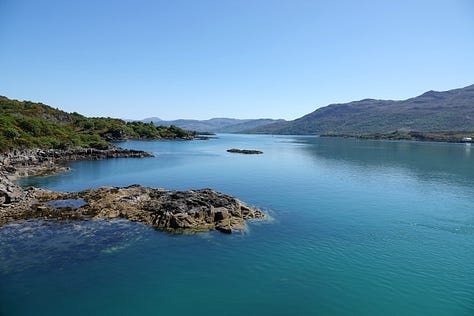

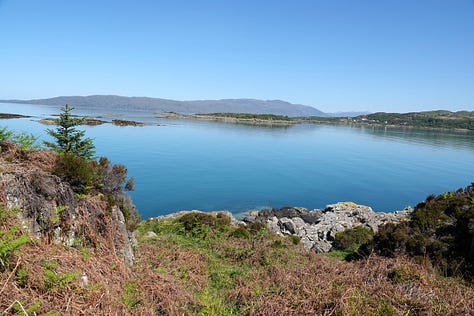

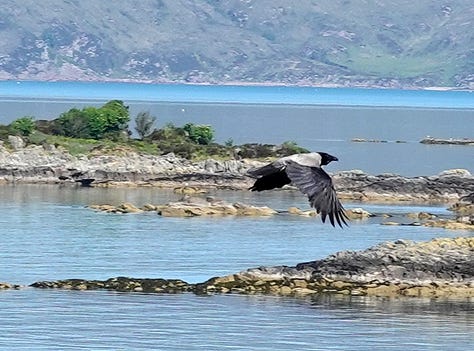

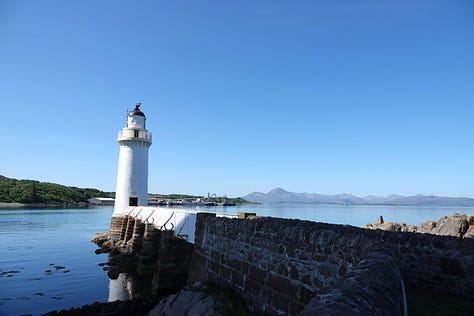

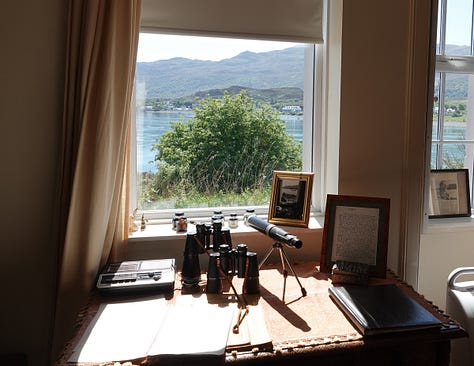
The bird that distracted me wasn’t the Skua in the above pictures, but a Common Redstart. I didn’t get a good photo of it, either! It’s very easy to sit in awe of the Scotland landscape and just snap away.
The desk remains as Gavin Maxwell left it, with scopes and field glasses for looking out his window as he wrote. The tree blocking the view would have been a sapling in 1969, and the far shore less developed. If I live in Scotland, I may join the Eilean Ban Trust and stay for a month on the island, giving tours and enjoying the relative peace.
If you visit the isle of Skye, email the Trust and schedule a visit to Eilean Ban. It’s a glimpse into what life there was like before the bridge was built in the ‘90s, and a small monument to a complicated life made briefly bright and beautiful by the exuberant joy of otters.
I can’t say, “ring of bright water” without singing it to the tune of “Paperback Writer” by the Beatles, so I leave you with this earworm:
Dear Sir or Madam, could you spare a fish?
I’m a hungry otter and it’s my only wish
I live in a cottage with a man named Gav
And I’m the best otter that he’ll ever have
Ring of Bright Water… Ring of Bright Water!
If you would like to support the rescued foxes cared for by Mikayla’s family, the Save-a-Fox Patreon remains active, run by her spouse.
If you want to read about otters by a naturalist writer and photographer who manages to not get any killed, I recommend Charlie Hamilton James here on Substack. He took some amazing photos of otters underwater:






There's an eeriness to the Scottish lands that's probably connected with the scant visible life you mention here. Sometimes it's hard to imagine what it was like before the Highland Clearances, and even centuries before that when there were more trees and otters, beavers and wolves. (Can't remember if I ever mentioned the Scotland Outdoors podcast to you. I haven't listened in a while but it was one of my favorites for a long time!)
The island my great great grandfather emigrated from in Ireland is now a wildlife sanctuary. I think of what drove his people to such a remote place to begin with. Sometimes sent as criminals or rebels or with nowhere else to run. His descendants were some of the first to arrive in California. How far away can we go before, before …